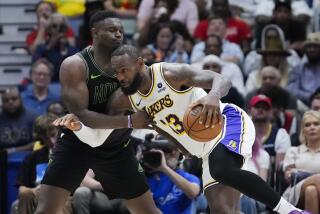Clemens sues former trainer
HOUSTON -- Roger Clemens threw two high and hard fastballs at his accuser Monday, filing a lawsuit against his former strength coach in which he contended Brian McNamee made “absolutely false and defamatory” statements claiming he had injected Clemens with steroids and human growth hormone and then releasing a tape of a secretly recorded telephone call between the two men.
Clemens also said he would testify before Congress next week, setting up a potentially dramatic showdown there, with McNamee expected to sit behind the same witness table and both men expected to testify under oath. Rusty Hardin, the attorney for Clemens, said his client would answer every question even with litigation now pending.
“He’s not going to hide behind the 5th Amendment,” Hardin said.
Richard Emery, an attorney for McNamee, criticized Clemens and Hardin for replaying a private telephone conversation during a nationally televised news conference.
“It’s war now,” Emery said.
Earl Ward, another attorney for McNamee, has threatened to file a defamation suit against Clemens.
“No countersuit is coming any time soon,” Emery said, “until I believe people believe what Roger is saying.”
Clemens’ lawsuit portrays McNamee as an unreliable witness, alleging McNamee denied to federal investigators Clemens used steroids and HGH, then changed his story under interrogation. Hardin said Mitchell did not appear to sufficiently establish McNamee’s credibility.
Yet Clemens’ credibility was called into question on one issue Monday. In a CBS interview that aired Sunday, Clemens said he had no advance warning what the Mitchell Report might say about him.
On Monday, however, Hardin said McNamee had alerted Clemens’ agents eight days before the report was released. Hardin said Clemens was told of McNamee’s general allegations four days before its release and was told more specifically of them after McNamee met with Hardin’s investigators the day before its release.
At that point, however, Hardin said he was uncertain whether Mitchell would include McNamee’s allegations -- or any player names, for that matter -- in his report.
After the report was issued, McNamee and Clemens did not speak until Friday, after McNamee sent a text message saying he wanted to talk and that his 10-year-old son was seriously ill. Hardin said the conversation could be taped without McNamee’s consent under the law in Texas, where Clemens lives, and New York, where McNamee lives.
Hardin played the 17-minute conversation -- which opens with a brief discussion about McNamee’s son and then shifts to the steroid allegations -- in the news conference.
“It shows how cynical and disgusting Roger Clemens and Rusty Hardin are,” Emery said, “that they’d exploit a sick child of Brian’s.”
Once Clemens and McNamee start discussing the allegations, Clemens repeatedly asks for someone to tell the truth and McNamee repeatedly asks what Clemens would like him to do.
At one point, McNamee said, “I’ll go to jail. I’ll do whatever you want.” McNamee testified before Mitchell under a federal plea agreement in which he would not be prosecuted unless he made a false statement.
McNamee was “plainly” telling Clemens he would be willing to lie, Emery said.
“It was incredibly stupid for Brian to make that phone call,” Emery said.
At no point in the conversation does McNamee retract his allegations or does Clemens specifically ask him to do so.
“I’m trying to find out why you would tell guys that I used steroids,” Clemens said.
“I understand that,” McNamee said.
Said Hardin: “All during this tape, when Roger says he didn’t do it, McNamee never says, ‘Yes, you did.’ ”
Emery noted that, whenever McNamee asked Clemens what he could do, Clemens never said, ‘Don’t lie.’ ”
At one point, McNamee asks whether Clemens would like him to attend the news conference, but Clemens does not accept or reject the offer. In the news conference, Clemens suggested that idea might not have been wise.
“I would love for him to come down here,” Clemens said. “I would be afraid for him, because my family is very upset.”
At another point in the conversation, Clemens said, “I just need you to come out and tell the truth.”
“I don’t have any money,” McNamee responded. “I have nothing. I’m not doing a book deal. I got offered seven figures to go on TV. I didn’t do it. I didn’t take it. I didn’t do anything.
“All I did was what I thought was right. And I never thought it was right, but I thought that I had no other choice.”
In a conversation with Hardin’s associates cited in the lawsuit, McNamee said federal investigators contacted him last summer and told him they had evidence of his involvement in drug trafficking and he could face prison time. McNamee told those associates that he had “repeatedly denied” during an initial interrogation that Clemens “had used steroids or HGH.”
In another interrogation the next day, the suit claims, assistant U.S. Atty. Matthew Parrella reminded him he could face jail if he lied to a federal agent and redirected the conversation to Clemens. Then, “and for the first time in his life,” the suit claims McNamee claimed Clemens used steroids and HGH.
The U.S. attorney’s office declined to comment.
After this “recantation,” the suit alleges, McNamee repeated those claims to federal investigators and Mitchell’s investigators so as to remain a “witness” in the federal case rather than a “target” of prosecution.
According to the suit, McNamee said “his Mitchell Commission interview was conducted like a Cold War-era interrogation, in which a federal agent merely read to the Mitchell investigators McNamee’s previously obtained statement and then asked McNamee to confirm what he previously stated.”
Mitchell called that allegation “untrue.” He said he and his staff interviewed McNamee three times, with Mitchell asking most of the questions in an initial meeting that lasted 2 1/2 hours. On occasion, Mitchell said, McNamee would be asked to recap or clarify a previous statement.
In all three sessions, Mitchell said via e-mail, “There was no ‘Cold War-era’ reading of McNamee’s prior statements by any federal official, as alleged.”
Clemens stormed out of his news conference after dismissing any suggestion that his offensive is geared toward keeping him in the good graces of Hall of Fame voters.
“I don’t need the Hall of Fame to justify that I put my butt on the line and I worked my tail off,” Clemens said, “and I defy anybody to say I did it by cheating or taking any shortcuts.”
--
lance.pugmire@latimes.com
More to Read
Get our high school sports newsletter
Prep Rally is devoted to the SoCal high school sports experience, bringing you scores, stories and a behind-the-scenes look at what makes prep sports so popular.
You may occasionally receive promotional content from the Los Angeles Times.








